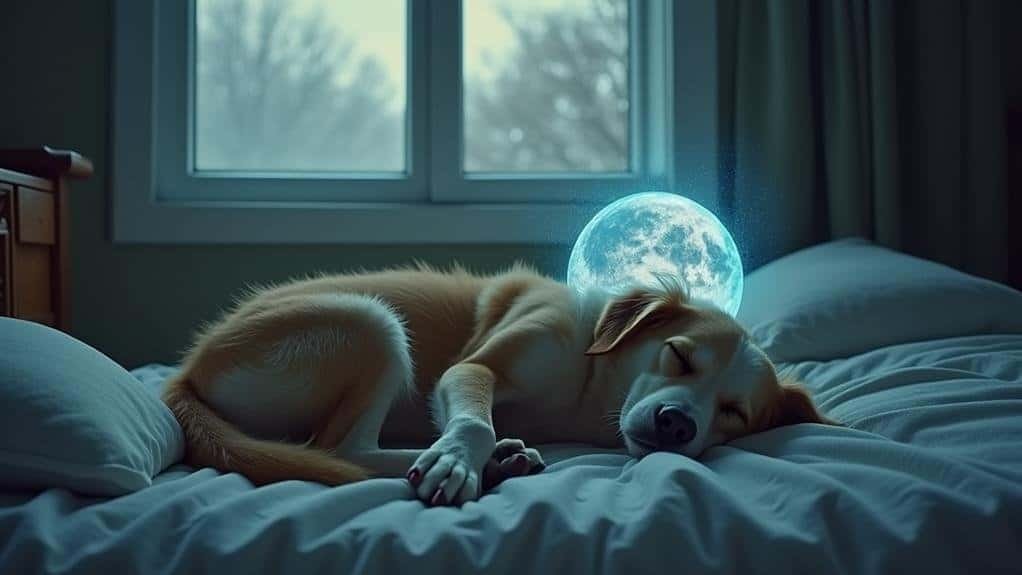Dogs cry in their sleep due to their unique sleep cycles and emotional processing. During REM sleep, which lasts 1-5 minutes, your dog may vocalize as they dream and process daily experiences.
These sounds can range from whimpers to cries, reflecting various emotions. Physical discomfort, such as arthritis or digestive issues, can also trigger sleep vocalizations.
Some breeds are more prone to making sounds due to their physical traits or anxiety levels. While occasional crying is normal, persistent vocalizations may indicate underlying health concerns.
Understanding Canine Sleep Cycles

While humans typically experience long, uninterrupted sleep periods, dogs have a unique sleep pattern that’s quite different from ours. Your canine companions have shorter sleep cycles, averaging around 45 minutes each, which include both NREM and REM sleep phases.
During REM sleep, which lasts 1 to 5 minutes, dogs are most likely to dream, exhibiting signs of dreaming such as twitching or vocalizations. Interestingly, larger breeds tend to have longer REM periods, dreaming for about 5 minutes per cycle, while smaller breeds may dream for only 1 minute. You might notice your dog crying in their sleep or whimpering during these REM phases, which is completely normal.
Dogs’ sleep cycles are polyphasic, meaning they take multiple naps throughout the day instead of one long sleep period. This pattern allows them to remain alert to potential threats or changes in their environment.
Various factors can influence your dog’s sleep, including age, breed, environmental conditions, and overall health. Understanding these unique aspects of canine sleep cycles can help you better interpret your dog’s behavior and guarantee they’re getting the rest they need for peak health and well-being.
Common Causes of Sleep Vocalizations

Curiosity often drives pet owners to wonder why their furry friends vocalize during sleep. The primary reason dogs cry, whimper, or bark while sleeping is linked to their REM sleep phase. During this stage, your dog processes daily experiences and emotions, which can result in various vocalizations.
Emotional processing plays a significant role in these sleep sounds. Joyful dreams may lead to soft whimpering, while anxiety or distress can cause more intense crying.
Physical discomfort, such as pain from injuries or conditions like arthritis, can also trigger sleep vocalizations, signaling a need for attention.
Certain breeds, especially those with flat faces, may be more prone to making noises during sleep due to breathing difficulties that worsen in deep sleep.
It’s crucial to understand your dog’s sleep cycles and monitor the frequency and intensity of these vocalizations. While occasional sounds are normal, excessive or unusual noises may indicate underlying health issues that require veterinary attention.
Dreaming and Emotional Processing

During sleep, your dog’s mind is far from idle. Like humans, dogs experience REM sleep, an essential phase for emotional processing and dreaming. This stage typically lasts between 1 to 5 minutes in their sleep cycles, during which your furry friend may relive their daily experiences in vivid detail.
As your dog dreams, you might notice vocalizations such as crying or whimpering. These sounds aren’t cause for alarm; they’re often a normal part of your pet’s emotional processing. Your dog’s dreams can reflect a range of emotions, from joy to fear, based on their waking experiences.
If you hear your dog crying or whimpering in their sleep, it’s likely they’re working through these feelings in their subconscious.
Sometimes, these vocalizations may indicate underlying anxiety or stress your dog has experienced while awake. However, it’s important to remember that crying during sleep is typically a harmless and natural occurrence.
Physical Discomfort During Rest

Physical discomfort can also trigger your dog’s nocturnal vocalizations. If you notice your furry friend crying or whimpering during sleep, it might be due to underlying health issues affecting their rest. Conditions like arthritis, injuries, or digestive problems can cause discomfort that disrupts your dog’s sleep cycles.
Watch for signs of restlessness, frequent position changes, and vocalizations during the night. These behaviors may indicate that your dog is experiencing pain or discomfort while trying to sleep. Persistent crying during rest can lead to decreased sleep quality and negatively impact your pet’s overall well-being.
Other health concerns, such as acid reflux or heart failure, can also result in night-time discomfort, prompting your dog to vocalize during sleep.
It’s essential to pay attention to these signs and consult a veterinarian if you notice your dog consistently crying while resting. A professional can help identify and address any underlying issues causing your pet’s distress.
Breed-Specific Sleep Behaviors

Dog breed characteristics play a significant role in sleep-related vocalizations. You’ll notice that certain breeds are more prone to crying or whimpering in their sleep due to their unique physical and emotional traits.
Brachycephalic breeds, like Bulldogs and Pugs, may vocalize more during rest due to their breathing difficulties. These breeds might whimper or cry as they struggle to breathe comfortably while sleeping.
Smaller dogs tend to have shorter sleep cycles and experience more frequent REM sleep episodes, which can lead to increased vocalizations during dreaming.
Terriers are known for their active dreaming, often resulting in more pronounced movements and sounds while asleep. If you have an anxious breed, such as a Chihuahua or Dachshund, you might observe more frequent crying or whimpering in their sleep due to their heightened emotional responses.
Understanding your dog’s breed-specific sleep behaviors can help you interpret their vocalizations better. While some breeds are naturally more vocal during sleep, excessive crying might still indicate underlying issues.
Always monitor your dog’s sleep patterns and consult a veterinarian if you’re concerned about their nighttime vocalizations or emotional state.
When to Seek Veterinary Help

Sleep disturbances in your furry friend can sometimes be a cause for concern. If you notice your dog crying unusually or excessively during sleep, it’s important to pay attention as this may indicate underlying medical issues.
While occasional vocalizations are normal, persistent or disruptive crying could signal a need to seek veterinary help.
Keep an eye out for additional symptoms accompanying these sleep disturbances. Pacing, lethargy, or changes in appetite, when combined with unusual sleep behavior, may warrant a visit to the vet.
If you’re unsure whether your dog’s crying is cause for alarm, start keeping a log of their sleep behavior and any associated signs. This information can be invaluable to your veterinarian in diagnosing potential health concerns.
Sudden or drastic changes in your dog’s sleep patterns or vocalizations should prompt you to consult a professional. Excessive crying during sleep might be linked to anxiety or past trauma, requiring specialized intervention.
Creating a Comfortable Sleep Environment

Just as humans need a cozy bedroom for restful sleep, your canine companion requires a comfortable environment to guarantee quality rest.
To create an ideal sleeping space for your dog, start by choosing a quiet, dark, and temperature-controlled area. This will help minimize distractions and promote deeper sleep cycles.
Provide soft bedding that supports your dog’s joints, especially if they’re older or have arthritis. This can greatly enhance their sleep quality and comfort.
Establish a routine for bedtime, including consistent sleep times, to help your furry friend feel secure and develop regular sleep patterns.
Consider using white noise machines or calming music to mask any disruptive sounds and create a soothing atmosphere.
Confirm the sleeping area is draft-free and familiar to your dog, reducing anxiety during rest periods.
Frequently Asked Questions
What Does It Mean When a Dog Cries While Sleeping?
When your dog cries while sleeping, it’s usually dreaming during REM sleep. They’re likely reliving daily experiences or processing emotions. It’s typically normal behavior, but if it’s excessive or accompanied by other symptoms, you should consult your vet.
What Are Dogs Dreaming About When They Whimper?
When your dog whimpers during sleep, they’re likely dreaming about their daily experiences. They might be reliving exciting playtimes, processing emotions, or even chasing imaginary squirrels. It’s their way of mentally reviewing and sorting through the day’s events.
Should I Wake My Dog up if He’s Crying in His Sleep?
You shouldn’t wake your dog if he’s crying in his sleep. It can startle him and potentially lead to aggression. Instead, let him sleep undisturbed. If you’re concerned, gently reassure him by softly calling his name.
Why Does My Dog Yelp in Pain While Sleeping?
Your dog may yelp in pain while sleeping due to physical discomfort from conditions like arthritis or injuries. It could also be from nightmares or anxiety. If it’s frequent, you should consult a vet to rule out health issues.
Conclusion
You’ve now gained insight into why your furry friend might cry in their sleep. Remember, it’s often harmless and part of their natural sleep cycle. However, if you’re concerned about excessive vocalizations or unusual behaviors, don’t hesitate to consult your vet. By understanding your dog’s sleep patterns and creating a cozy environment, you’ll help guarantee they get the restful sleep they need. Sweet dreams for both you and your canine companion!

